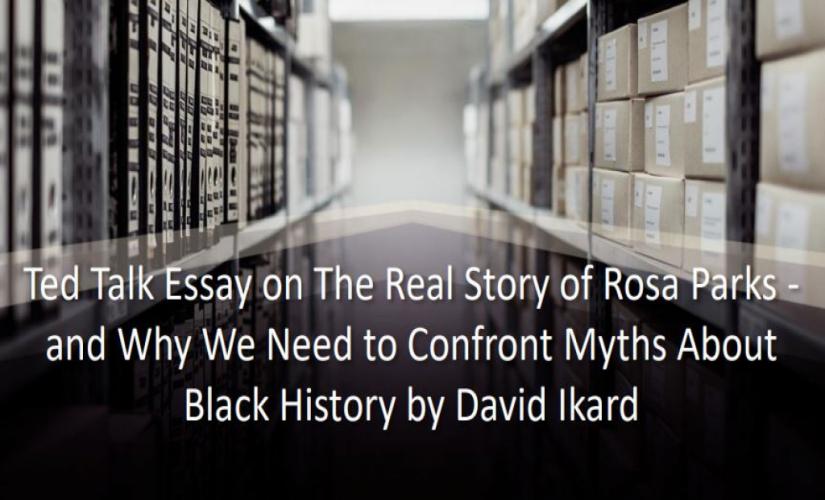Myths and false accounts characterize Black history in America, as it is discussed in this Ted Talk essay on “The Real Story of Rosa Parks – and Why We Need to Confront Myths About Black History” by David Ikard. While listening to Elijah’s narration of what he learned from school, Ikard realized that what his son’s teacher shared in the class had a lot of false information. Therefore, the speaker demystifies the myths surrounding African-American history, as people need to appreciate and share correct historical contents, but, his talk includes some bias on racism.
Importance of Learning History
Interestingly, Ikard demystified myths concerning Black history. For example, Elijah’s teacher, in her lesson, described Rosa Parks as an old and frail Black woman with tired feet (Ikard 01:00-01:13). In this case, Rosa was not old, and she was only tired of inequality and oppression that the Blacks experienced. Hence, the teacher’s account had false information and mythologies, as it did not depict the real reflection of Black history.

Moreover, Blacks were treated as second class citizens. For instance, Rosa was arrested following a bus boycott after she refused to give her seat to a white passenger (Reyburn 1). Basically, the whites were a more superior race. In this case, Ikard’s approach to enabling his son to learn correct accounts of history by buying him Rosa Parks’s autobiography was practical because, after reading the book, Elijah learned real facts about Black history (Ikard 03:00-03:23). Later, Elijah did a presentation in class on the same topic, and his teacher corrected the inaccuracies that she had previously made. Therefore, the used tactics were effective in the video used by David Ikard. Both his son and his classmates were able to learn the actual accounts of Rosa Parks and the struggles of the blacks.
Learning and Sharing History
Additionally, society must learn to appreciate history and share historical accounts, as they were. For instance, history shapes the community, as people can learn where they came from, the events of the past, and how to develop their future (O’Brien par. 1). Basically, history is relevant in the modern-day. In turn, teachers need to cover the real accounts of history, as subjectification will enable learners to realize their values and ideals, developing individually with distinct positions in society (Straaten et al. 5). In the case of the video by Ikard, deviating from the truth does not help a child in understanding their history. Besides, the author is persuasive because, before suggesting to purchase the book for his son to read about Rosa Parks and her efforts, he explains why the account given by his teacher includes some inaccuracies and told the boy about the truth. Thus, learning and appreciating historical facts enables people to have personalized ideologies.
Bias
Nonetheless, Ikard includes some bias on the issue of racism. For example, the author depicts all whites as racists who enjoy white privilege, do not welcome any challenge, and become angry when questioned (Ikard 05:47-05:58). His thoughts of the whites would make his son develop a prejudice against other races. Hence, it is unfair to perceive all whites as racists.
Conclusion
In conclusion, the video “The Real Story of Rosa Parks – and Why We Need to Confront Myths About Black History” by David Ikard is informative, as people can learn the significance of telling history. Giving false or incorrect accounts, especially to children, interferes with their ability to appreciate history and have a personalized ideology. Although African-Americans were subjected to racial discrimination by whites, not all whites are racists. Thus, one should not generalize.
Works Cited
Ikard, David. “The Real Story of Rosa Parks – and Why We Need to Confront Myths About Black History.” TED, 2020, www.ted.com/talks/david_ikard_the_real_story_of_rosa_parks_and_why_we_need_to_confront_myths_about_black_history.
O’Brien, Devin. “How History Shapes Our World Today.” The Odyssey Online, 2019, www.theodysseyonline.com/importance-history.
Reyburn, Susan. Rosa Parks: In Her Own Words. The University of Georgia Press, 2019.
Straaten, Dick Van, et al. “Making History Relevant to Students by Connecting Past, Present, and Future: A Framework for Research.” Journal of Curriculum Studies, vol. 48, no. 4, 2015, pp. 479–502, doi:10.1080/00220272.2015.1089938.


